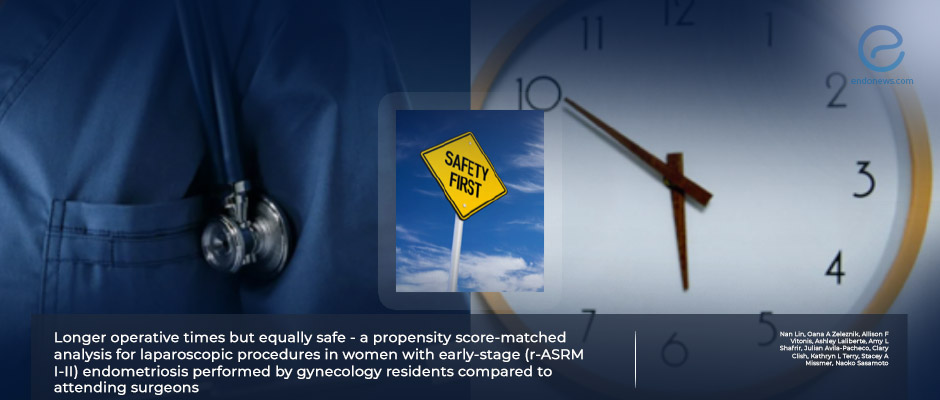Safety of Resident-Performed Early Stage Endometriosis Surgery Assessed
May 7, 2025
Training Status of Surgeon Affects Efficiency, Not Safety, in Laparoscopic Treatment of Early Endometriosis
Key Points
Highlights:
- Residents or fellows can safely operate on patients with early-stage endometriosis.
- Operative times are slightly longer when surgeries are performed by trainees compared to experienced surgeons.
Importance:
- The results highlight the viability of supervised, hands-on training for residents in minimally invasive gynecologic surgery.
What’s done here:
- This is a retrospective study at the University Hospital Mainz, Germany, analyzing data from 2018 to 2022.
- The effect of surgical experience on the safety and efficiency of minimally invasive surgery to treat early-stage endometriosis was assessed.
- Surgical outcomes of patients with rASM stage I–II endometriosis who operated on by 11 attending surgeons and 22 residents/fellows were compared.
- Intraoperative and postoperative complication rates and length of hospital stay were primary outcomes, operative time and the need for revision surgery were also assessed.
Key results:
- Surgeries performed by residents or fellows were, on average, 5.27 minutes longer than surgeries performed by experienced surgeons, statistically significant.
- Surgeries to treat stage 2 endometriosis performed by residents or fellows were on average 9.54 minutes longer than those performed by experienced surgeons, statistically significant.
- There were no significant differences between surgeries performed by experienced surgeons or residents, or fellows in terms of complications during or after surgery or length of hospital stay.
Limitations:
- This is a single-center retrospective study, deep endometriosis lesions were not evaluated.
- Minor surgical complications were not taken into account, and the findings are only valid for early-stage endometriosis.
FROM THE EDITOR-IN-CHIEF - ENDONEWS
"This study offers timely and relevant evidence on the safety and efficiency of laparoscopic training in early-stage endometriosis. The findings support the continued value of supervised, hands-on training in the operating room.
As healthcare systems face increasing pressure to streamline surgical productivity, this work reminds us that protecting structured surgical education is essential—not only for training future surgeons, but for maintaining patient safety. Simulation-based programs may offer a complementary path forward, but real-world surgical experience remains irreplaceable.
We commend the authors for contributing high-quality data to a critical and evolving area of gynecologic training."
Lay Summary
Gynecology residents and fellows can safely perform minimally invasive surgery for early-stage endometriosis, according to a new study from researchers in Germany.
Although operative times are slightly longer when procedures are performed by trainees, patient safety and recovery outcomes remain comparable to those of experienced surgeons.
To evaluate the impact of surgical experience on safety and efficiency, Dr. Schmidt and the team led by Dr. Roxana Schwab at the University Medical Centre Mainz analyzed data from 580 patients with stage I or II endometriosis who underwent laparoscopic surgery between 2018 and 2022.
Among these patients, 339 endometriosis surgeries were performed by 11 attending surgeons, while 241 were performed by 22 residents or fellows under supervision.
The study found that surgeries performed by trainees lasted, on average, 5.27 minutes longer than those conducted by experienced surgeons.
In stage II cases, the difference in operative time increased to 9.54 minutes. However, there were no significant differences between the groups in terms of intraoperative or postoperative complications or length of hospital stay.
The authors emphasize that these findings support the current stepwise surgical training approach and suggest that expanding access to simulation-based training may further improve efficiency, reduce institutional costs, and help offset decreasing in-theater training opportunities for residents.
The study was published in the peer-reviewed journal BMC Medical Education.
Research Source: https://pubmed.ncbi.nlm.nih.gov/40148842/
early-stage endometriosis laparoscopy surgical complications

